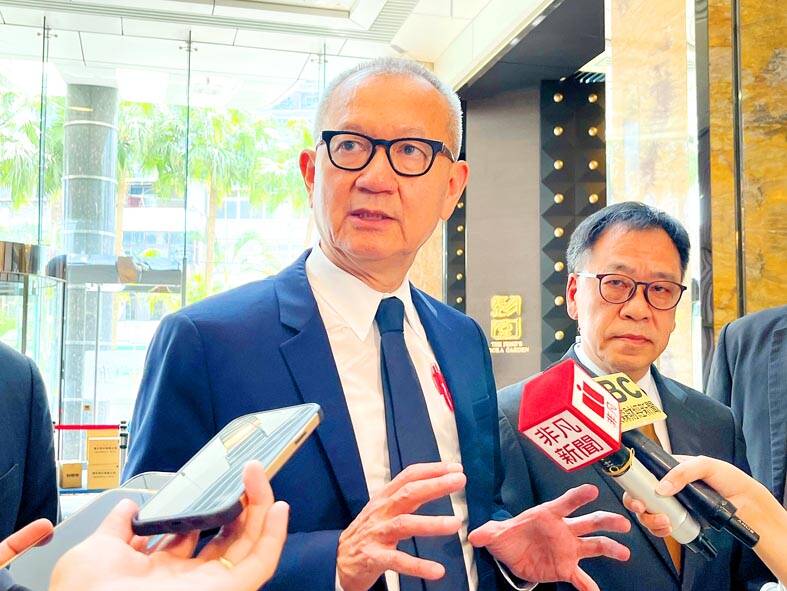Yageo Corp (國巨), the world’s third-largest multilayer ceramic capacitors supplier, saw its stock price spike 1.35 percent in the morning session after it reported a yearly growth of 11 percent in net profits and gave an upbeat outlook for the current quarter.
Shares retreated in the later trading session and closed 0.84 percent lower at NT$588 yesterday. The stock outperformed the broader TAIEX, which tumbled 3.81 percent.
Net profits expanded to NT$4.61 billion (US$141.79 million) last quarter, from NT$4.13 billion in the first quarter last year, representing a quarterly decline of 2.9 percent. Earnings per share rose to NT$11.02 last quarter from NT$9.9 a year earlier, but lower than NT$11.35 a quarter earlier.

Photo: CNA
Yageo is optimistic about this quarter’s business outlook, although full-blown recovery in demand is not happening yet, it said.
One more encouraging sign is that channel inventory correction, which has been closely monitored by investors, is coming to an end this quarter, the company said during an online investors’ conference on Thursday, adding that it already saw “some restocking activities” this quarter.
“From the market side, we see a couple of positive signs. Segments like computing and telecom and mobile are picking up slightly and gradually picking up,” Yageo CEO David Wang (王淡如) said. “We see artificial intelligence [AI] indeed is a very positive trend. We believe that with comprehensive product offerings and strong design capabilities, we are prepared to grow with this trend.”
Yageo has witnessed a significant annual growth in components used in AI applications, such as servers and data centers, in the first quarter of this year, Yageo executive vice president of global sales and marketing Claudio Lollini said on Thursday.
Those components deliver better margins than the corporate average level, given the higher degrees of design involved, Lollini said.
New projects are also kicking in, Lollini added.
For the current quarter, the company saw its book-to-bill ratio stand at 1, Wang said, an indication that the company’s business is in a good shape.
Revenue this quarter is to grow sequentially at a low-single-digit percentage from the NT$28.51 billion generated in the first quarter, Wang said, adding that gross margin would also improve by low-single-digit percentage points from 33.8 percent last quarter.
Yageo also guided for a mild improvement in factory utilization this quarter, likely the first advancement since the fourth quarter of 2022.
The utilization of manufacturing equipment for premier passive components would rise slightly this quarter, compared with 70 percent registered last quarter, Yageo said, adding that the usage of manufacturing equipment for commodity-type products would also go up slightly from 50 percent last quarter.
Premium components accounted for about 75 percent of the company’s revenue, Yageo said.
Its sensor business accounted for 12 percent of the company’s revenue last quarter, which was singled out for the first time since its acquisition of Telemecanique Sensors last year. Magnetic components were the biggest revenue contributor last quarter, accounting for 30 percent. That was followed by multilayer ceramic capacitors’ 20 percent.
The industrial segment made up 36 percent of last quarter’s revenue while the computing, enterprise systems segment, which includes components used in servers, was the second-largest, accounting for 21 percent.

Macronix International Co (旺宏), the world’s biggest NOR flash memory supplier, yesterday said it would spend NT$22 billion (US$699.1 million) on capacity expansion this year to increase its production of mid-to-low-density memory chips as the world’s major memorychip suppliers are phasing out the market. The company said its planned capital expenditures are about 11 times higher than the NT$1.8 billion it spent on new facilities and equipment last year. A majority of this year’s outlay would be allocated to step up capacity of multi-level cell (MLC) NAND flash memory chips, which are used in embedded multimedia cards (eMMC), a managed

CULPRITS: Factors that affected the slip included falling global crude oil prices, wait-and-see consumer attitudes due to US tariffs and a different Lunar New Year holiday schedule Taiwan’s retail sales ended a nine-year growth streak last year, slipping 0.2 percent from a year earlier as uncertainty over US tariff policies affected demand for durable goods, data released on Friday by the Ministry of Economic Affairs showed. Last year’s retail sales totaled NT$4.84 trillion (US$153.27 billion), down about NT$9.5 billion, or 0.2 percent, from 2024. Despite the decline, the figure was still the second-highest annual sales total on record. Ministry statistics department deputy head Chen Yu-fang (陳玉芳) said sales of cars, motorcycles and related products, which accounted for 17.4 percent of total retail rales last year, fell NT$68.1 billion, or

In the wake of strong global demand for AI applications, Taiwan’s export-oriented economy accelerated with the composite index of economic indicators flashing the first “red” light in December for one year, indicating the economy is in booming mode, the National Development Council (NDC) said yesterday. Moreover, the index of leading indicators, which gauges the potential state of the economy over the next six months, also moved higher in December amid growing optimism over the outlook, the NDC said. In December, the index of economic indicators rose one point from a month earlier to 38, at the lower end of the “red” light.

MediaTek Inc (聯發科) shares yesterday notched their best two-day rally on record, as investors flock to the Taiwanese chip designer on excitement over its tie-up with Google. The Taipei-listed stock jumped 8.59 percent, capping a two-session surge of 19 percent and closing at a fresh all-time high of NT$1,770. That extended a two-month rally on growing awareness of MediaTek’s work on Google’s tensor processing units (TPUs), which are chips used in artificial intelligence (AI) applications. It also highlights how fund managers faced with single-stock limits on their holding of market titan Taiwan Semiconductor Manufacturing Co (TSMC, 台積電) are diversifying into other AI-related firms.